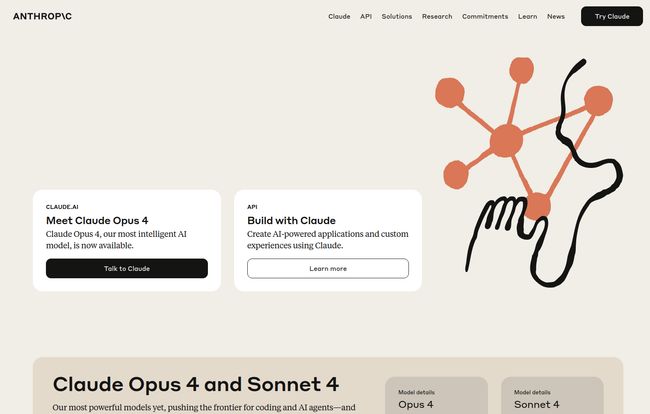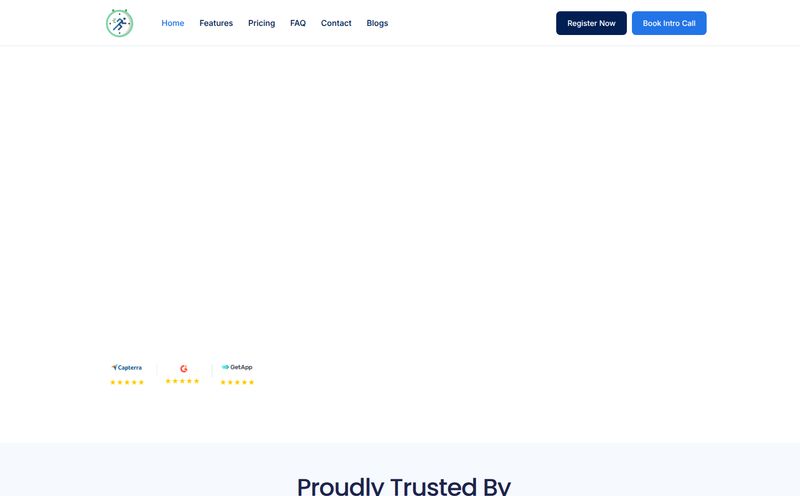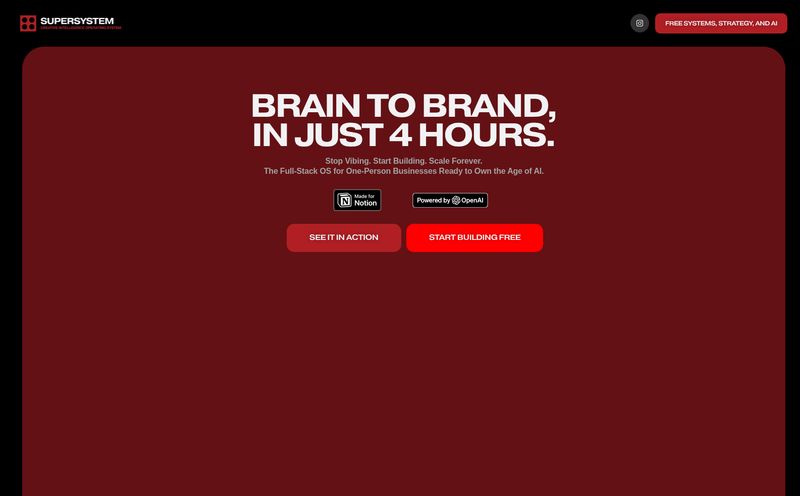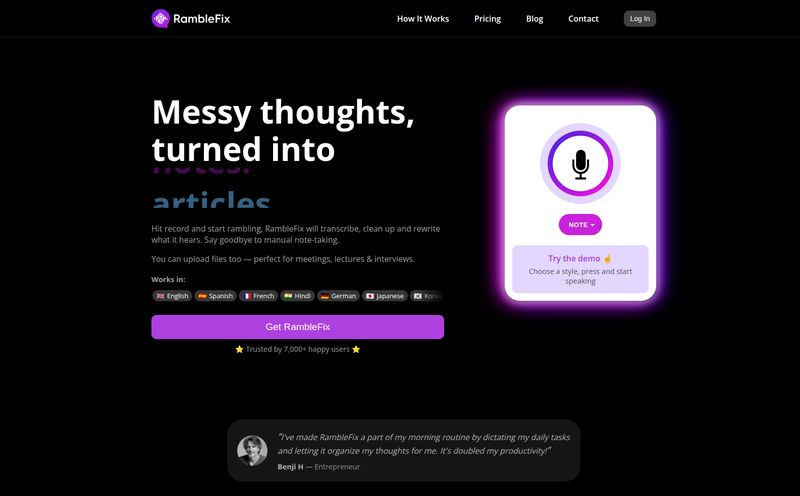For the last couple of years, my world—the world of SEO, traffic, and content—has been absolutely swamped by the AI tidal wave. At first, it was exhilarating. The sheer speed! The new possibilities! It felt like we were all handed a magic wand. But then... the weirdness started. You know what I'm talking about. The confidentally incorrect facts, the bizarre 'hallucinations', the content that just felt... hollow. It’s like eating junk food; it fills a space but offers zero nutrition.
It's made a lot of us in the trenches a bit cynical. So when another AI company pops up on my radar, my first reaction is usually a weary sigh. But Anthropic feels different. I've been keeping an eye on them for a while, and they aren't screaming from the rooftops about breaking the world. They're talking about safety, reliability, and building “humane intelligence.” Honestly, it’s a refreshing change of pace. But does a focus on safety mean they've sacrificed power? I had to find out.
So, What's the Big Deal with Anthropic Anyway?
Unlike some of the other players who seem to have burst onto the scene overnight, Anthropic comes from a background of research. Their whole mission, as they put it, is to build reliable, interpretable, and steerable AI systems. That's a mouthful, but what it means in plain English is that they're trying to build an AI that you can actually trust. They are obsessed with AI safety, which, in a world where AIs are helping write code and legal documents, seems like a pretty good obsession to have.
This isn't just marketing fluff. It's baked into their DNA. They’re the folks asking the hard questions, like the one from their CEO, Dario Amodei:
If knowledge is power and we're building AIs that are much more knowledgeable than us, what will happen between us and the AIs we build?
That's the kind of thinking that leads to a more robust and, frankly, less terrifying tool.
Meet the Claude Family of Models
Anthropic's flagship product is Claude, and it’s not a one-size-fits-all deal. It's more like a team of specialists you can call on depending on the job. They've been iterating fast, and the current lineup is seriously impressive.
Claude 3 Opus, The Heavy Lifter
Think of Opus as the senior strategist on your team. You bring it the really complex problems—deep analysis, multi-step tasks, brainstorming high-level strategy. It's the most powerful (and most expensive) model, and it's designed for tasks that require some serious brainpower. It has a massive 200,000 token context window, which means you can feed it an entire novel or a dense financial report and it won't forget what you were talking about by page three. A real game changer.
Claude 3.5 & 3.7 Sonnet, The All-Rounder
Sonnet is your go-to for most everyday work. It strikes a fantastic balance between intelligence and speed. I've found it's perfect for writing articles, summarizing long emails, and generating solid code snippets. It’s the reliable workhorse that gets the job done without the premium price tag of Opus. For most businesses and professionals, Sonnet is probably the sweet spot.

Visit Anthropic
Claude 3.5 Haiku, The Speedster
Then you have Haiku. As the name suggests, it's fast and light. This model is built for speed and cost-effectiveness. Think instant customer service chats, quick content moderation, or any task where a near-instant response is more important than deep, nuanced reasoning. It’s surprisingly capable for its size and a fantastic option for high-volume tasks.
Why I'm Genuinely Impressed with Claude's Abilities
Talk is cheap, I know. But after putting Claude through its paces, a few things really stand out, especially compared to some of its rivals.
First off, the low hallucination rate is a breath of fresh air. In my line of work, an AI that makes up sources or stats is worse than useless; it's a liability. Claude seems to have a better grasp on when it doesn't know something, and it's far less likely to just invent an answer to please you. This builds a foundation of trust that's been sorely missing in the AI space.
The security is another huge plus. Anthropic boasts about its best-in-class jailbreak resistance. The whole cat-and-mouse game of trying to trick AIs into bypassing their own safety protocols is a huge problem. Knowing that Claude is built on a foundation of security makes it a much more viable option for enterprises handling sensitive data. It’s not just a clever chatbot; it's a tool designed for professional environments.
And it's not just about what it doesn't do wrong. Its advanced reasoning and vision analysis are top-notch. You can upload a chart, a UI mockup, or a photo, and it can analyze it with incredible accuracy. For coders, its ability to generate, debug, and explain code is a massive productivity boost. It's a genuinely versatile tool.
Let's Talk Money: Breaking Down Claude's Pricing
Alright, so how much does this thoughtful AI cost? The pricing structure is actually pretty straightforward, which I appreciate. They have plans for individuals and for teams.
| Plan | Price | Best For |
|---|---|---|
| Free | $0 | Everyday users wanting to try out the basic features and chat. |
| Pro | $20/month ($17 with annual sub) | Individuals and professionals who need more usage, access to newer models, and advanced features. |
| Team | $30/person/month ($25 with annual sub) | Businesses (min 5 members) needing centralized billing, more usage, and collaboration tools. |
| Enterprise | Contact Sales | Large organizations needing maximum security, SSO, and custom usage. |
For developers, there's also API access, with pricing based on usage (input/output tokens). A cool little detail is the 50% discount on batch processing, which is a nice nod to businesses with big, non-urgent workloads. Overall, the pricing feels fair and scalable.
The Other Side of the Coin
No tool is perfect, right? While I'm very positive about Claude, there are a few things to keep in mind. The most powerful features and highest usage limits are, naturally, behind a paywall. The free version is great for a test drive but you'll hit the usage caps pretty quickly if you're doing any serious work.
Also, getting the most out of it via the API does require some technical know-how. This isn't a criticism so much as a reality check—it’s a powerful platform for developers, but it’s not exactly a simple plug-and-play solution for your grandma. But then again, what API is?
Conclusion: A Thoughtful AI for a Chaotic World
So, is Anthropic's Claude the AI for you? If you’re a business that values accuracy and security over hype, my answer is a resounding yes. If you’re a creator tired of fighting with nonsensical AI output, you’re going to love it. If you're a developer looking for a robust and reliable model to build on, you should have started testing it yesterday.
Anthropic isn't trying to win the race for the flashiest demo. Instead, they feel like they're building a tool meant to last, one that partners with you rather than just spitting out text. In an industry moving at a breakneck pace, this thoughtful, safety-first approach might just be the thing that wins the marathon. It’s made me a little less cynical about the future of AI, and a little more hopeful. And in 2024, that's saying something.
Frequently Asked Questions
What makes Anthropic different from OpenAI?
While both are leaders in AI, Anthropic's core mission is explicitly focused on AI safety and research. They prioritize creating models that are reliable and resistant to misuse, which informs their entire development process. This safety-first approach is their main differentiator.
Is Claude 3 better than GPT-4?
"Better" is subjective and depends on the task. Many benchmarks and user experiences suggest Claude 3 Opus can outperform GPT-4 in complex reasoning, long-context tasks, and has a lower rate of generating incorrect information (hallucinations). For other tasks, they might be comparable. The best way to know is to try both for your specific use case.
Can I use Claude for free?
Yes! Anthropic offers a free tier that allows you to chat with Claude and use its basic features. However, usage is limited. For more extensive use, access to the most powerful models, and advanced features, you'll need one of the paid plans like Pro or Team.
What is a "context window" and why does 200K matter?
A context window is the amount of information (text, code, etc.) the AI can "remember" and consider in a single conversation. A 200,000-token window is massive—it's roughly equivalent to 150,000 words or a 500-page book. This allows you to feed Claude very large documents or have extremely long, detailed conversations without it losing track of what's going on.
Is Claude safe to use for sensitive business data?
Anthropic has built its platform with security as a top priority. For their business and enterprise customers, they offer strong security and compliance measures. They do not train their models on customer data submitted via their API or business offerings. However, as with any third-party service, you should always review their latest security and privacy policies, especially their security page.



